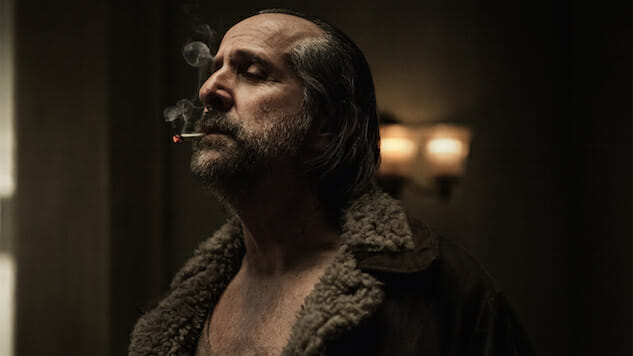In American Gods‘ “The Secret of Spoon,” the American Dream Is a Beautiful Lie
(Episode 1.02)
Starz
You can’t tell a story about America without looking at the horrors in its history, and how they shaped the horrors of today. In a fiery (literally) introduction, Anansi (Orlando Jones) does just that when he speaks to black men captured and stolen to America as slaves in 1679. In his speech, during the prologue of “The Secret of Spoon,” Anansi connects America’s history of slavery to modern racism and police brutality. With this coming-to-America story, American Gods emphasizes the specifically American story it’s telling.
Images of Americana appear throughout the episode: the buffalo on Shadow’s (Ricky Whittle) T-shirt, a road trip through the Midwest, shopping in a superstore, a cowboy on the cover of a romance novel. Specifically American ideas and phrases come up repeatedly—it’s no coincidence that when Media (Gillian Anderson) wants to talk to Shadow, she takes the form of Lucy in I Love Lucy, an emblem of American sitcoms. American Gods began with a black man being lynched while a crowd looked on—a particularly American horror. (Also, is no one going to address how Shadow got down from that tree?) When Shadow agrees to play checkers with Czernobog (a very effective Peter Stormare), he says that all the men are equal in checkers, making it a more American game than chess, which is ruled by kings and queens. But the eldest Zorya sister (Cloris Leachman) telling pretty lies about living a long and happy life in America might be the most American idea of all.
Anansi tells some lies himself—or, at least, not the entire truth. His story inspires the men on the ship to rebel against their captors, but it’s Anansi who ultimately benefits. When Anansi says, “At least die a sacrifice for something worthwhile,” he’s talking about himself. His motives seem more about ensuring his survival than helping any of his followers. American Gods is full of half-truths that hide who’s making what moves and for what reasons. (As Ian McShane’s Wednesday says, clues are not in the agreement.) This lack of context can be confusing, though it connects viewers with Shadow by putting them in the same position of figuring out this new world with limited knowledge.
I don’t want to tell anyone how to enjoy a TV show, but focusing on the plot in American Gods may not be the most fruitful way of watching. Instead of a story winding tighter, American Gods unspools, like the tale of an epic hero’s journey passed down over firelight. Instead of intricate plotting, the show explores feelings and themes of what it’s like to live in America from many different angles. It’s more focused on atmosphere and emotion than moving the story forward in a clear way. But that atmosphere is a lot of fun to explore.
-

-

-

-

-

-

-

-

-

-

-

-

-

-

-

-

-

-

-

-

-

-

-

-

-

-

-

-

-

-

-

-

-

-

-

-

-

-

-

-








































